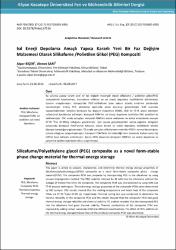Isıl Enerji Depolama Amaçlı Yapıca Kararlı Yeni Bir Faz Değişim Malzemesi Olarak Silikafume /Polietilen Glikol (PEG) Kompoziti
Özet
Bu çalışma yapıca kararlı yeni bir faz değişim materyali olarak silikafume / polietilen glikol(PEG)
kompozitinin hazırlanması, karakterize edilmesi ve ısıl enerji depolama özelliklerinin belirlenmesi
üzerine amaçlanmıştır. Kompozitler PEG’insilikafume içine vakum altında emdirme yöntemiyle
hazırlanmıştır. Erimiş PEG silikafume içerisinde akma davranışı göstermeden %30 oranında
hapsedilebilmiştir. Üretilen kompozit faz değişim malzemesi (FDM); SEM ve FT-IR analiz teknikleri
kullanılarak karakterize edilmiştir. Kompozit FDM’nin ısıl enerji depolama özellikleri DSC analizleri ile
belirlenmiştir. DSC analiz sonuçları kompozit FDM’nin erime noktasının ve erime entalpisinin sırasıyla
27.70 o
Cve 87.09J/g olduğunu göstermiştir. Çok sayıda gerçekleştirilen ısıtma-soğutma döngüleri
sonucunda kompozit FDM’lerinin kimyasal olarak kararlı ve enerji depolama özelliklerini önemli
düzeyde koruduğunu göstermiştir. TG analiz sonuçları silikafumeye emdirilen PEG’in termal kararlılığının
yüksek olduğunu ortaya koymuştur. Kompozit FDM’lerin ısıl iletkenliği farklı oranlarda karbon nano tüp
(CNTs) ilave edilerek arttırılmıştır. Ayrıca CNTs ilavesinin kompozit FDM’nin ısıl enerji depolama ve
salıverme süreleri üzerindeki etkisi araştırılmıştır. This paper is aimed to prepare, characterize, and determine thermal energy storage properties of
silicafume/polyethyleneglycol(PEG) composite as a novel form-stable composite phase change
material(PCM). The composite PCM was prepared by incorporating PEG in the silicafume by using
vacuum impregnation method. The PEG could be retained by 30 wt% into the silicafume without the
leakage of melted PEG from the composite. The composite PCM was characterized by using SEM and
FT-IR analysis techniques. Thermal energy storage properties of the composite PCMs were determined
by DSC analysis. DSC results showed that the melting temperature and latent heat of the composite
PCMs are 27.70 o
Cand 87.09 J/g, respectively. Thermal cycling test was conducted to determine the
thermal reliability of the composite PCM and the results showed that the composite PCM had good
thermal energy storage reliability and chemical stability. TG analysis revealed that the impregnated PEG
into the silicafume had good thermal stability. Thermal conductivity of the composite PCM was
improved by adding carbon nanotubes (CNTs) in different mass fractions. The effect of CNTs addition on
the thermal energy storage/release times of the produced composite PCM was also tested.
Kaynak
Fen ve Mühendislik Bilimleri DergisiCilt
17Sayı
2Bağlantı
http://fenbildergi.aku.edu.tr/wp-content/uploads/2017/10/025703-683-690.pdfhttp://hdl.handle.net/11630/4662
Koleksiyonlar
- Cilt 17 : Sayı 2 [53]



















